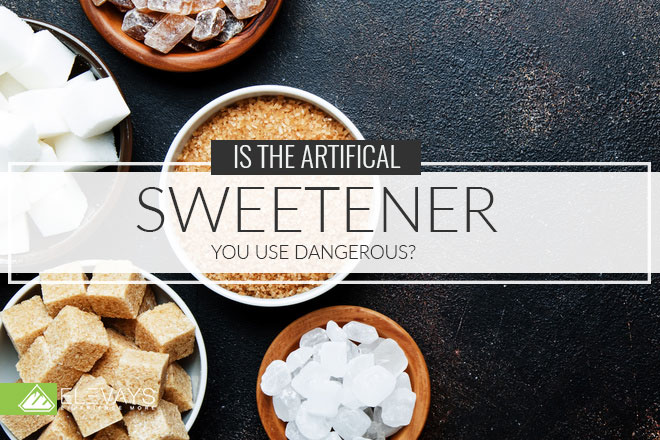Artificial sweeteners, also known as non-nutritive sweeteners, were first introduced to the market in the 1950s and have been controversial ever since. Extensive research finds that they are associated with various harmful side effects and dangerous symptoms all the way from migraines to cardiovascular disease to addiction!
Because artificial sweeteners do not stop cravings, they actually induce more and foster no sense of satisfaction. These non-caloric sweeteners retrain your taste buds to want more and more sweet foods.
While people may think artificial sweeteners, diet foods and drinks that contain them, are a good idea for losing weight- they actually do the opposite. Zero-calorie sweeteners have been linked to weight gain. A 2017 study suggests that artificial sweeteners had the potential to increase weight, BMI and risk of metabolic syndrome and type 2 diabetes.
Top 5 Artificial Sweeteners to Avoid at All Costs
Aspartame
Aspartame is found in the middle of your table at the cafe and falls under the alias’ Equal, NutraSweet and NatraTaste Blue. It’s also found in over 6,000 consumer foods and drinks, more than 500 prescription drugs and OTC medications.
Found to increase oxidative stress in the brain and potentially impair memory. A recent study also found that women who consumed artificial sweeteners, particularly aspartame, while breastfeeding or during pregnancy can result in babies who experience obesity or metabolic syndrome disorders later in life.
Acesulfame K
Acesulfame K can be found in Sunette, Equal Spoonful, Sweet One, ACE K, and Sweet ‘n Safe. Think sugar-free gum, candy, alcohol, and sweetened yogurt. Because our bodies can’t break this artificial sweetener down it is believed to have negative effects on our digestive system and metabolism.
Saccharin
Oh that cute little pink paper bag. Sweet n’ low. Saccharin, not only found in Sweet n’ Low but also children’s medication like cough syrup and chewable aspirin, was believed to potentially cause bladder cancer all the way back in the 1970s. While the FDA removed the warning label despite this on-going concern, saccharin has been linked to digestive issues, nausea, some types of cancer, and tachycardia.
Xylitol
Xylitol is a sugar alcohol and like other sugar alcohols- it is not well absorbed by the body- causing allergies and sensitivity. Gastrointestinal side effects like diarrhea, cramping, bloating, and gas are just some of the common side effects experienced with prolong use of this artificial sweetener. For more information about sugar alcohols, check out our article on dangerous and safe sugar alcohols.
Sucralose
Last but not least scary- Splenda! The Center of Science in the Public Interest placed Splenda in the “caution” category after a medical study that found its potential to be linked to leukemia in mice. Another study found that mixing with a high temperature could create toxic chemicals– and don’t most people use Splenda in their hot coffee?!
Another study published in 2018 found that sucralose and maltodextrin (another sugar alcohol) stimulated gut inflammation in mice that carried Crohns-like diseases.
5 Natural Sweeteners and Sugar Alternatives
If you still have a sweet tooth (who am I kidding, don’t we all?) then try these good for you, natural sweeteners.
Raw Honey
Raw honey is (in my book) the best natural sweetener. Essential nutrients like enzymes, antioxidants, calcium, iron, zinc, potassium, vitamin B6, riboflavin, niacin, and phosphorus promote free radical balance and healthy GI tract bacteria.
When purchasing raw honey try to opt for local. The darker the color, the bigger the benefits and flavor.
Stevia
Stevia supports weight loss and stable blood sugar levels. This is a perfect sugar alternative for people with diabetes or those on the ketogenic diet. It is 200 times sweeter than sugar so only use a tiny amount.
Maple Syrup
Maple Syrup is rich in antioxidants, potassium, calcium, and zinc which work similarly to raw honey in the way that it helps neutralize free radicals. When purchasing maple syrup opt for a darker Grade B syrup.
Coconut Sugar
Coconuts are truly a superfood. Coconut sugar has a low glycemic load but a high mineral content. Iron, calcium, potassium, polyphenols, phytonutrients, and antioxidants are some of the available nutrient content that can promote healthy well-being.
Dates
Dates are a great idea for making a paste and a wonderful addition for baking. High in magnesium, vitamin B6, copper, potassium, iron, and manganese they are easily digested and help reduce LDL cholesterol.
Sources:
- “Why You Should Ditch Artificial Sweeteners.” Dr. Mark Hyman, 2 Dec. 2015, drhyman.com/blog/2015/12/02/why-you-should-ditch-artificial-sweeteners/.
- Axe, Josh. “NEW RESEARCH: These 2 Zero-Calorie Sweeteners Can Still Lead to Diabetes & Obesity.” Dr. Axe, 22 Jan. 2019, draxe.com/artificial-sweeteners/.





READ the Latest
Health Habits
Longevity
Health Habits
Health Habits